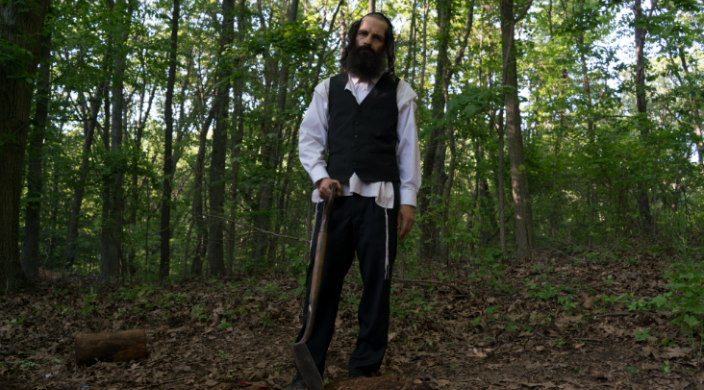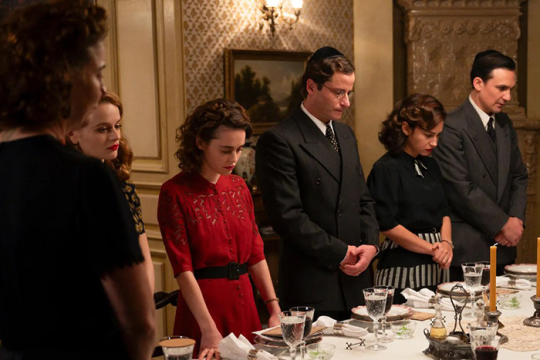
“For you are dust and to dust you shall return.” – Genesis 3:19
Most of us know the pain of losing a loved one. While Judaism provides us with a centuries-old method of mourning, each person grieves and reckons with loss in their own way. To Dust, the latest film by Reform Jewish filmmaker Shawn Snyder, discusses mourning in a way I’d never seen.
Shmuel (Géza Röhrig), a Hasidic cantor in Upstate New York, distraught by the untimely death of his wife, struggles to find religious solace, while secretly obsessing over how her body will decay. As a clandestine partnership develops with Albert (Matthew Broderick), a local community college biology professor, the two embark on a darkly comic and increasingly literal undertaking into the underworld.
Combining elements of drama, dark humor, B-horror film, and even the buddy comedy/road trip subgenres, To Dust is Snyder’s raw, personal love letter to Judaism – and especially to Jewish mourning and interpersonal connection.
To gain a deeper insight about this, I spoke with Snyder to learn more about what these ideas mean to him.
“I’ve always felt that Jewish mourning is so profound and wise,” Snyder explained. “And it’s incredibly intuitive to the understanding of grief and…amazingly life-affirming in the face of loss, and it also understands that there needs to be a period of excessive grief before following these guideposts to get back to the land of the living.”
Asked about the inspiration for his movie, Snyder explained:
“The biggest catalyst [was] losing my own mom just over 10 years ago last September to cancer…and I’d watched my mom lose her mom a few years prior, and I saw my mom mourn her mom in the Jewish way, [which also] felt necessary for me but also in a way to honor my mom and mourn alongside my family.”
Snyder also found himself inspired by the philosophies of Géza Röhrig, the actor who played Shmuel, who himself is Jewish and also acknowledges the inherent humanism of Judaism:
“[He] has these beautiful ways of getting very, very specific with it, that Judaism is one of the few religions that [believes], ‘Yes, the soul is divine, but the body is also divine…It’s not just the ‘shell,’ it is so divine because it’s the way we experience the world…We can think about the soul, we can worry about the soul, but how do we get through life here on earth with each other? How do we move on in a cycle that demands we keep moving on without the person who we’ve lost, and how do we keep that person alive?”
It is this focus on our corporeal form, our divine “shells,” that seems to be this movie’s strongest focus. Shmuel is obsessed with his wife’s natural return to the earth, believing that she will not be at peace until she is completely decomposed. While admittedly taken to bizarre lengths in the film, Snyder and I both acknowledged that this is a common, yet underdiscussed, thought among mourners. He told me,
“We have this morbid forensic curiosity about it. And I always found, one of the interesting ironies in the film…is that Judaism has a great blueprint to help you get through grief, and a proper Jewish burial is among the greenest burials one could ask for. [But Shmuel] is not satisfied by his religion [and] this rather green burial, [and that] is one of the points. Even still, there’s something…that’s missing for this man specifically about his wife and this relationship and a hole that needs to be filled.”
It seemed that what filled this hole in Shmuel’s life, at least partially, is his relationship with Albert (Matthew Broderick), whom he enlists to help him attempt to better understand the decaying process. Though Albert is not Jewish, he serves as the other side of the bridge of divine connection, for he slowly helps Shmuel come to terms with his wife’s death.
“Even the most unlikely person ends up being the most cathartic [and] healing… or at least the foremost,” Snyder explained.
Snyder also mentioned that Géza Röhrig posed this theory to him:
“‘Is God in us, or is God between us? ... Maybe both, but God is [definitely] between us.’ God is in the way we interact with other people, and the ultimate thing that allows for catharsis is some form of connection with another human.”
To me, this is the very essence of Judaism: our encouragement to connect with others, even with people and in ways we may not expect, during our most difficult times as a form of sacred healing.
Learn more about To Dust, and if you’d like to screen this film in your congregation or community, reach out to Good Deed Entertainment for more information. For more Jewish arts and culture content, subscribe to the Tuesday edition of our Ten Minutes of Torah series.
Related Posts

“We Were the Lucky Ones:” Bringing The Holocaust Out of History Books and Into Our Homes

Eight Unforgettable Jewish Oscar-Winning Movies

